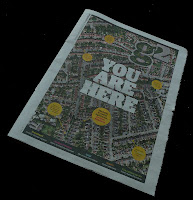Quoted in the papers
I was interviewed about the politics behind mapping technologies by Guardian journalist Oliver Burkeman a few weeks ago. His article, How Google and Apple's digital mapping is mapping us appeared in the paper yesterday. The article made the front cover of the G2 section and generated a good number of online comments. I got a small quote:
"The map is mapping us," says Martin Dodge, a senior lecturer in human geography at Manchester University. "I'm not paranoid, but I am quite suspicious and cynical about products that appear to be innocent and neutral, but that are actually vacuuming up all kinds of behavioural and attitudinal data."
The fact that I claimed not to be paranoid has raised a couple of comments from my colleagues.
Also, my recent book gets a nice name check in an interesting comment piece about the growing power of software algorithms in academia. The article is entitled Leave the thinking to us, in the Times Higher Education. It is by sociologist David Beer and he notes:
"In Rob Kitchin and Martin Dodge's book Code/Space: Software and Everyday Life (2011), the authors demonstrate the importance of software for the functioning of the social world everywhere from the home to air travel. It would be remiss to think that higher education somehow sits outside these broader social developments. Kitchin and Dodge point out that even mundane technologies such as Microsoft Word or Adobe Photoshop come "loaded" with "algorithmic normalities" that "subtly ... direct users to certain solutions". Without thinking too hard, we can immediately see that PowerPoint's algorithmic normalities are likely to be providing us with subtle directions in how to lecture."
I was interviewed about the politics behind mapping technologies by Guardian journalist Oliver Burkeman a few weeks ago. His article, How Google and Apple's digital mapping is mapping us appeared in the paper yesterday. The article made the front cover of the G2 section and generated a good number of online comments. I got a small quote:
"The map is mapping us," says Martin Dodge, a senior lecturer in human geography at Manchester University. "I'm not paranoid, but I am quite suspicious and cynical about products that appear to be innocent and neutral, but that are actually vacuuming up all kinds of behavioural and attitudinal data."
The fact that I claimed not to be paranoid has raised a couple of comments from my colleagues.
Also, my recent book gets a nice name check in an interesting comment piece about the growing power of software algorithms in academia. The article is entitled Leave the thinking to us, in the Times Higher Education. It is by sociologist David Beer and he notes:
"In Rob Kitchin and Martin Dodge's book Code/Space: Software and Everyday Life (2011), the authors demonstrate the importance of software for the functioning of the social world everywhere from the home to air travel. It would be remiss to think that higher education somehow sits outside these broader social developments. Kitchin and Dodge point out that even mundane technologies such as Microsoft Word or Adobe Photoshop come "loaded" with "algorithmic normalities" that "subtly ... direct users to certain solutions". Without thinking too hard, we can immediately see that PowerPoint's algorithmic normalities are likely to be providing us with subtle directions in how to lecture."



Comments
Post a Comment